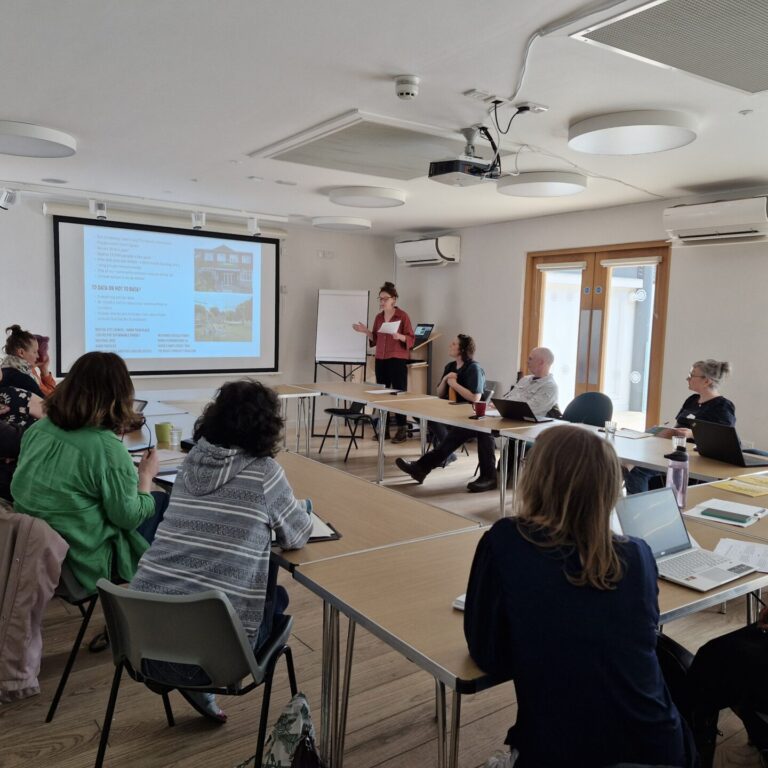Top tips for accessible community climate engagement
The group of local organisations on the Mission Net Zero workshop series, ‘Introduction to Community Action on Climate and Energy’, gathered in person for the final workshop on 3 June. Participants had expressed an interest in hearing an in-depth case study, so we were pleased to invite Ella Tainton, the Climate and Nature Action Coordinator from Southmead Development Trust to tell us about their journey. From developing a community climate action plan in 2024, Southmead Development Trust has gone on to participate in the Transforming Energy Together programme, as well as developing an investable proposal for the Net Zero Finance Co-innovation Lab.
Ella shared her approach to talking to residents about climate and nature action, including how to use data in a way that provides useful insights, but recognises its limitations, echoing the discussions at our last workshop on data tools for community engagement. She pointed out that as well as the quantitative data that online tools and maps can provide, photos, historical archives, recordings, stories and interviews, are all kinds of data that build a picture of a place.
“I don’t like categorising Southmead to just numbers. Our community doesn’t like the language of “deprivation” always being used to describe them when we can feel rich in other ways. So, it’s important context, but use stats as a building block to investigate areas which might need focus or point to a gap in your [community engagement] work. Human stories can be much more intricate and rich.”
She also shared seven brilliant tips that encapsulate her approach to community climate action, making it accessible while acknowledging that there are limits to what can be achieved.
Mix up the do-able with the ambitious
Sometimes building trust comes from getting stuff done quickly. It’s good to have some short term, tangible actions so your discussions with the community feel like they’re going somewhere. Small events like a seed and plant swap, a shared meal or coffee morning can take place to start a conversation. Equally our communities deserve to think big and deliver impactful results so don’t shy away from something ambitious.
Learning can come from things that don’t work
Project funding pots and short timeframes sometimes mean that anything that doesn’t have instant impact feels like failure, but there’s still valuable learning in a low-event turnout or door knocking session. Take time to reflect and revise.
It can’t all be your responsibility
The climate and nature crisis touches all aspects of our community’s lives. As community organisations and meeting places we often feel a lot of pressure to solve everything. But some responsibility lies in partnerships, private business, local authority and central government. Identify what your role is, what is in your wheelhouse, where you can have the most impact. Could you provide the meeting space, be a social connector, run an advice hub, welcome people to a green space, offer activities for young people?
It’s ok if it feels like hard work
Climate work is tiring, emotional, provocative, unrelenting, technical, and sometimes controversial. You can feel at the coal face of a lot of big issues in society. Take a breather, look after each other, find other people working in this space, don’t bite off too much at once.
Don’t let perfect be the enemy of good
A plan is better than no plan. It’s great just to have started this process. Be conscious and intentional in how to do it well but don’t agonise over getting it ‘right’.
There’s no need to reinvent the wheel
Lots of people in the city and beyond are doing climate work. Use their resources and experiences and adapt it for your community. If people already offer a service (such as energy advice and retrofit training) don’t duplicate – ask if they can deliver from your space or run a bespoke session for your staff or volunteers. Use Corporate Social Responsibility groups to get some big jobs done. Groundbreaking work seems shiny and exciting but tried-and-tested often means getting stuff done quicker.
Climate action by stealth
Insights from other community partners Kirsty Tait of Heart of BS13 and Donna Sealey from Ambition Lawrence Weston, highlight that many community concerns can be met by action on climate and nature, but that they don’t always immediately seem relevant to the climate emergency. For example, growing projects that increase access to culturally appropriate food while providing habitats for pollinators, and how being involved in such projects can help to create a sense of agency over what happens where you live.
With her work around energy and home retrofit, Ella demonstrated that there’s much more to be gained than lower energy bills, although of course this is a high priority for many, like an improved sense of place and a healthier home to live in. She shared that her favourite learning is that people get involved in climate action for different reasons, and that meeting new residents has been a real highlight of the work.
Some of the unexpected support she found included a local church that is part of the eco-churches network, parents at the adventure playground who were members of Greenpeace in their youth, and a retired plumber who was happy to demonstrate how to apply bathroom sealant to residents learning about draughtproofing.
- Read Southmead Development Trust’s Community Climate Action plan
- See their proposal in the Net Zero Finance Co-innovation Lab prospectus
- Read more about their work, including street tree planting, community gardening, a repair cafe and their Transforming Energy Together project
This workshop series is part of Mission Net Zero and is funded by Innovate UK’s Net Zero Living programme. Bristol Climate & Nature Partnership, Centre for Sustainable Energy, Bristol Energy Network, and Bristol City Council are working together to deliver this workshop series.
Share to
